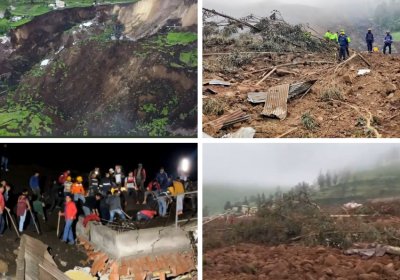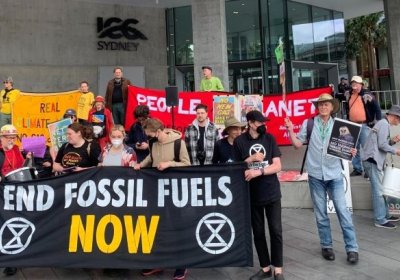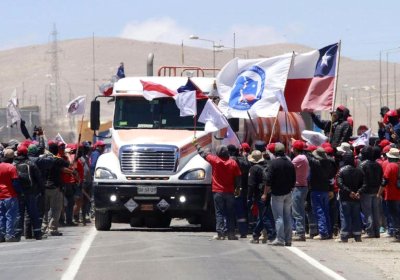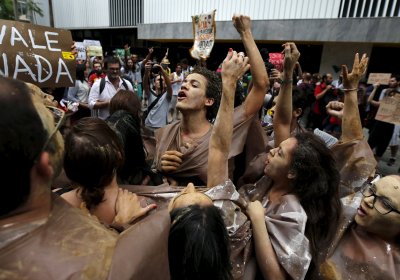Despite the region’s steep topography and vulnerability to earthquakes, companies are seeking to exploit Ecuador’s Chimborazo province for large-scale copper and gold mining, reports Ana Zorita.
BHP Billiton (BHP)
There is a disconnect of time scales between the relatively short-lived exploitative mining and Traditional Owners’ ancient connection to Country. Susan Norrie writes about her and artist colleagues' approach to a commission.
About 30 activists defied police intimidation to protest the International Mining and Resources Conference at the International Convention Centre in Darling Harbour. Kerry Smith reports.
Uncle Kevin Buzzacott, an elder of the Triabunna people in the Lake Eyre region of far northern South Australia, is campaigning for Santos and other gas companies to be prevented from destroying country. Renfrey Clarke reports.
Modern Australia remains profoundly shaped by the violent dispossession of Indigenous people. Denying this history serves a real and material purpose for very powerful interests, argues Sam Wainwright.
The world premiere of a 14-year struggle for jobs will be screened at this year's “virtual” Sydney Film Festival. Women of Steel, a finalist for an award, documents a hard-won campaign by women in the Illawarra to force BHP to hire them, write Pip Hinman and Peter Boyle.
The world’s biggest producer of iron ore, Vale, has again distanced itself from an ecological and workplace disaster of its own making, writes Pip Hinman.
It has been revealed that corporate mining giant BHP Billiton used a simple accounting trick to avoid paying iron ore royalties to the Western Australian government for over a decade. Last year, BHP took in a profit of $9.5 in iron ore from WA.
Below is an abridged version of a speech delivered by socialist unionist Robynne Murphy to this year’s ACTU Congress. Murphy spoke alongside three women from the Electrical Trades Union, who had formed the “Sparkettes”, a network to support other women in their union.
* * *
I worked at the steelworks in Port Kembla for 30 years, during which time I was involved in a long campaign with mainly migrant women for the right for women to have secure and well-paid jobs.
About 2500 workers have been on strike since February 9 at the Escondida mine in Chile’s north.
Owned by two Anglo-Australian mining giants, BHP Billiton and Rio Tinto, Escondida is the largest producer of “red gold” in the world. The mine extracts about 900,000 tonnes a year. This represents 20% of copper production in Chile, the country with the largest copper reserves in the world.
A strike at Chile's Escondida copper mine, the world’s largest, entered its fifth day on February 13 with few signs of speedy resolution as workers threaten to stop production for up to two months.
Workers began a strike at the Australian-run BHP Billiton mine on February 9 to put pressure on the company after failing to reach an agreement in wage negotiations.
The union said its 2500 members are committed to action and threatened a two-month work stoppage, leading BHP to admit that it will not be able to meet its contractual obligations.
BHP Billiton executives faced dissident shareholders at the company’s annual general meeting in Brisbane on November 17 over its responsibility for the Samarco tailings dam disaster in Brazil last year.
The protesters want Australia’s biggest company to compensate the victims. BHP jointly owns the iron ore mine with Brazilian mining giant, Vale.
- Page 1
- Next page











